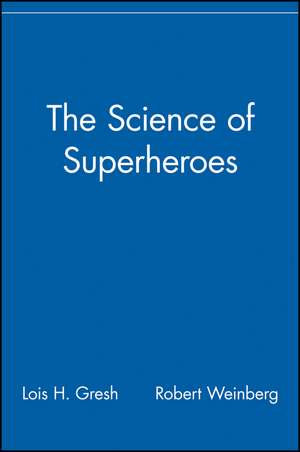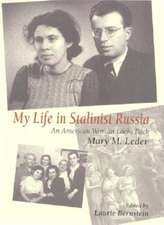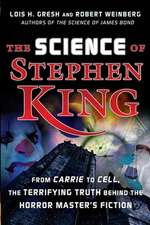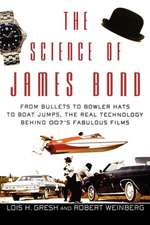The Science of Superheroes
Autor Lois H. Gresh, Robert Weinbergen Limba Engleză Paperback – 9 oct 2003
Julius Schwartz, Editor Emeritus, DC Comics
Superman, Batman, The X–Men, Flash, Spider Man . . . they protect us from evildoers, defend truth and justice, and, occasionally, save our planet from certain doom. Yet, how much do we understand about their powers?
In this engaging yet serious work, Lois Gresh and Robert Weinberg attempt to answer that question once and for all. From X–ray vision to psychokinesis, invisibility to lightspeed locomotion, they take a hard, scientific look at the powers possessed by all of our most revered superheroes, and a few of the lesser ones, in an attempt to sort fact from fantasy. In the process, they unearth some shocking truths that will unsettle, alarm, and even terrify all but the most fiendish of supervillains.
Lois Gresh (Rochester, NY) has written eight novels and nonfiction books as well as dozens of short stories and has been nominated for national fiction awards six times.
Robert Weinberg (Oak Forest, IL) is a multiple award–winning author of novels, nonfiction books, short stories and comics.
| Toate formatele și edițiile | Preț | Express |
|---|---|---|
| Paperback (1) | 107.63 lei 3-5 săpt. | |
| Wiley (TP) – 9 oct 2003 | 107.63 lei 3-5 săpt. | |
| Hardback (1) | 163.94 lei 3-5 săpt. | |
| Wiley (TP) – 26 sep 2002 | 163.94 lei 3-5 săpt. |
Preț: 107.63 lei
Nou
Puncte Express: 161
Preț estimativ în valută:
20.60€ • 22.37$ • 17.30£
20.60€ • 22.37$ • 17.30£
Carte disponibilă
Livrare economică 01-15 aprilie
Preluare comenzi: 021 569.72.76
Specificații
ISBN-13: 9780471468820
ISBN-10: 0471468827
Pagini: 208
Dimensiuni: 155 x 237 x 15 mm
Greutate: 0.29 kg
Editura: Wiley (TP)
Locul publicării:Hoboken, United States
ISBN-10: 0471468827
Pagini: 208
Dimensiuni: 155 x 237 x 15 mm
Greutate: 0.29 kg
Editura: Wiley (TP)
Locul publicării:Hoboken, United States
Public țintă
1. Comic book fans. 2. Science readers.Descriere
"Entertaining and informative."
Julius Schwartz, Editor Emeritus, DC Comics Praise for The Science of Superheroes
"We comics fans have known it for years, of course: somewhere, in some nether dimension or on some alternate world, there is an Earth on which superheroes are real . . . and now Lois Gresh and Bob Weinberg have shown us how that’s possible. To paraphrase an old DC Comics feature: Science says you’re wrong if you believe that The Science of Superheroes isn’t more fun than a barrel of genetically altered winged monkeys."
Roy Thomas, writer and editor of X–Men, Fantastic Four, The Incredible Hulk, Superman, Justice League of America, Legion of Superheroes, Star Wars, and many other comic book classics
"Weinberg and Gresh tell it like it is and how it would be, if our favorite comic book characters actually existed. The Science of Superheroes is a fascinating and entertaining examination of everything from astrophysics to genetic biology to the evolution of the ‘superhero.’ "
Mark Powers, editor of X–Men and Uncanny X–Men
The Science of Superheroes takes a lighthearted but clear–headed look at the real science that underlies some of the greatest superhero comic books of all time, including Spider–Man, Batman, Fantastic Four, and many more. Each chapter presents the story of the origin of one or more superheroes and asks intriguing questions that lead to fascinating discussions about the limits of science, the laws of nature, and the future of technology.
If gamma rays can’t turn a 128–pound weakling into the Incredible Hulk, what could? Are Spider–Man’s powers really those of a spider? Could a person ever breathe water like a fish? From telepathy to teleportation, from cloning to cosmic rays, this vastly entertaining romp through the nexus of science and fantasy separates the possible from the plausible and the barely plausible from the utterly ridiculous.
Julius Schwartz, Editor Emeritus, DC Comics Praise for The Science of Superheroes
"We comics fans have known it for years, of course: somewhere, in some nether dimension or on some alternate world, there is an Earth on which superheroes are real . . . and now Lois Gresh and Bob Weinberg have shown us how that’s possible. To paraphrase an old DC Comics feature: Science says you’re wrong if you believe that The Science of Superheroes isn’t more fun than a barrel of genetically altered winged monkeys."
Roy Thomas, writer and editor of X–Men, Fantastic Four, The Incredible Hulk, Superman, Justice League of America, Legion of Superheroes, Star Wars, and many other comic book classics
"Weinberg and Gresh tell it like it is and how it would be, if our favorite comic book characters actually existed. The Science of Superheroes is a fascinating and entertaining examination of everything from astrophysics to genetic biology to the evolution of the ‘superhero.’ "
Mark Powers, editor of X–Men and Uncanny X–Men
The Science of Superheroes takes a lighthearted but clear–headed look at the real science that underlies some of the greatest superhero comic books of all time, including Spider–Man, Batman, Fantastic Four, and many more. Each chapter presents the story of the origin of one or more superheroes and asks intriguing questions that lead to fascinating discussions about the limits of science, the laws of nature, and the future of technology.
If gamma rays can’t turn a 128–pound weakling into the Incredible Hulk, what could? Are Spider–Man’s powers really those of a spider? Could a person ever breathe water like a fish? From telepathy to teleportation, from cloning to cosmic rays, this vastly entertaining romp through the nexus of science and fantasy separates the possible from the plausible and the barely plausible from the utterly ridiculous.
Textul de pe ultima copertă
"Entertaining and informative."
Julius Schwartz, Editor Emeritus, DC Comics Praise for The Science of Superheroes
"We comics fans have known it for years, of course: somewhere, in some nether dimension or on some alternate world, there is an Earth on which superheroes are real . . . and now Lois Gresh and Bob Weinberg have shown us how that’s possible. To paraphrase an old DC Comics feature: Science says you’re wrong if you believe that The Science of Superheroes isn’t more fun than a barrel of genetically altered winged monkeys."
Roy Thomas, writer and editor of X–Men, Fantastic Four, The Incredible Hulk, Superman, Justice League of America, Legion of Superheroes, Star Wars, and many other comic book classics
"Weinberg and Gresh tell it like it is and how it would be, if our favorite comic book characters actually existed. The Science of Superheroes is a fascinating and entertaining examination of everything from astrophysics to genetic biology to the evolution of the ‘superhero.’ "
Mark Powers, editor of X–Men and Uncanny X–Men
The Science of Superheroes takes a lighthearted but clear–headed look at the real science that underlies some of the greatest superhero comic books of all time, including Spider–Man, Batman, Fantastic Four, and many more. Each chapter presents the story of the origin of one or more superheroes and asks intriguing questions that lead to fascinating discussions about the limits of science, the laws of nature, and the future of technology.
If gamma rays can’t turn a 128–pound weakling into the Incredible Hulk, what could? Are Spider–Man’s powers really those of a spider? Could a person ever breathe water like a fish? From telepathy to teleportation, from cloning to cosmic rays, this vastly entertaining romp through the nexus of science and fantasy separates the possible from the plausible and the barely plausible from the utterly ridiculous.
Julius Schwartz, Editor Emeritus, DC Comics Praise for The Science of Superheroes
"We comics fans have known it for years, of course: somewhere, in some nether dimension or on some alternate world, there is an Earth on which superheroes are real . . . and now Lois Gresh and Bob Weinberg have shown us how that’s possible. To paraphrase an old DC Comics feature: Science says you’re wrong if you believe that The Science of Superheroes isn’t more fun than a barrel of genetically altered winged monkeys."
Roy Thomas, writer and editor of X–Men, Fantastic Four, The Incredible Hulk, Superman, Justice League of America, Legion of Superheroes, Star Wars, and many other comic book classics
"Weinberg and Gresh tell it like it is and how it would be, if our favorite comic book characters actually existed. The Science of Superheroes is a fascinating and entertaining examination of everything from astrophysics to genetic biology to the evolution of the ‘superhero.’ "
Mark Powers, editor of X–Men and Uncanny X–Men
The Science of Superheroes takes a lighthearted but clear–headed look at the real science that underlies some of the greatest superhero comic books of all time, including Spider–Man, Batman, Fantastic Four, and many more. Each chapter presents the story of the origin of one or more superheroes and asks intriguing questions that lead to fascinating discussions about the limits of science, the laws of nature, and the future of technology.
If gamma rays can’t turn a 128–pound weakling into the Incredible Hulk, what could? Are Spider–Man’s powers really those of a spider? Could a person ever breathe water like a fish? From telepathy to teleportation, from cloning to cosmic rays, this vastly entertaining romp through the nexus of science and fantasy separates the possible from the plausible and the barely plausible from the utterly ridiculous.
Cuprins
Preface. A Word about the Law.
Introduction: Men of Steel, Feathers of Fury ( Dean Koontz).
Chapter 1. More Powerful than a Speeding Locomotive: Superman.
Chapter 2. Rays Cosmic and Gamma: The Fantastic Four and the Incredible Hulk.
Chapter 3. The Dark Knight: Batman.
Chapter 4. Under the Sea: Aquaman and Sub–Mariner.
Chapter 5. Along Came a Spider: Spider–Man.
Chapter 6. Green Lanterns and Black Holes: Magic, Science and Two Green Lanterns.
Chapter 7. Of Atoms, Ants, and Giants: Ant Man and the Atom.
Chapter 8. Fast, Fast, Fast: The Flash.
Chapter 9. Good, Evil, and Indifferent Mutants: The X–Men.
Chapter 10. Mysteries in Space: Science Fiction Superheroes.
Chapter 11. The Right Stuff: Donald Duck.
Appendix A: Who Missed the Cut?
Appendix B: The Professionals Speak.
Bibliography and Reading List.
Acknowledgments.
Index.
Introduction: Men of Steel, Feathers of Fury ( Dean Koontz).
Chapter 1. More Powerful than a Speeding Locomotive: Superman.
Chapter 2. Rays Cosmic and Gamma: The Fantastic Four and the Incredible Hulk.
Chapter 3. The Dark Knight: Batman.
Chapter 4. Under the Sea: Aquaman and Sub–Mariner.
Chapter 5. Along Came a Spider: Spider–Man.
Chapter 6. Green Lanterns and Black Holes: Magic, Science and Two Green Lanterns.
Chapter 7. Of Atoms, Ants, and Giants: Ant Man and the Atom.
Chapter 8. Fast, Fast, Fast: The Flash.
Chapter 9. Good, Evil, and Indifferent Mutants: The X–Men.
Chapter 10. Mysteries in Space: Science Fiction Superheroes.
Chapter 11. The Right Stuff: Donald Duck.
Appendix A: Who Missed the Cut?
Appendix B: The Professionals Speak.
Bibliography and Reading List.
Acknowledgments.
Index.
Recenzii
"... the science of superheroes suggests that a number of them are feasible, including Batman and the Incredible Hulk..." (Independent on Sunday, 26 October 2003)
"... the science of superheroes suggests that a number of them are feasible, including Batman and the Incredible Hulk..." (Independent on Sunday, 26 October 2003)
"... the science of superheroes suggests that a number of them are feasible, including Batman and the Incredible Hulk..." (Independent on Sunday, 26 October 2003)
Notă biografică
LOIS GRESH is the author of eight books and has been nominated for national fiction awards six times. She serves as Creative–Technical Director of a communications company and is coauthor, along with Robert Weinberg, of The Computers of Star Trek. ROBERT WEINBERG?s fiction has been nominated for Hugo, World Fantasy, and Stoker Awards. He was the 2002 winner of the Bram Stoker Award for Best Illustrated Narrative for his comic book series, Nightside. At present, Weinberg writes the comic book series Extinction Event for Wildstorm Comics. He previously served for twenty years as chairman of the Chicago Comicon, the second–largest comic convention in the United States.















